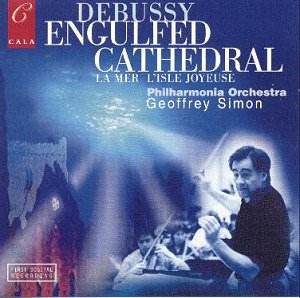Claude DEBUSSY (1862-1918)
The Engulfed Cathedral (arr. Stokowski)
L'Isle Joyeuse (Molinari)
Deux Arabesques (Mouton)
La Mer
Bruyères (Percy Grainger)
Danse-Tarantelle Styrienne (Ravel)
Children's Corner (Caplet)
 Geoffrey Simon conducts The
Philharmonia Orchestra
Geoffrey Simon conducts The
Philharmonia Orchestra
 CALA CACD1024 [69:18]
CALA CACD1024 [69:18]
'Recorded at St. Jude-on-the-Hill, Hampstead, London: January
1990. High Resolution remastering February 2000 Recoupled and remastered
from the original Cala Records releases CACD1001 and
CACD1002'
Crotchet

I suggest that this review is read in conjunction with that of the Cala companion
Debussy album, 'Night in Granada' which I am reviewing
this month too.
Many musicians have felt compelled to transcribe many of Debussy's highly
atmospheric and evocative piano pieces for orchestra. This album, together
with its companion disc is a fascinating collection of some of these
transcriptions.
Stokowski's transcription of La Cathédral Engloutie
from Debussy's First Book of Preludes published in 1910 is a sonic spectacular
realised wonderfully in this vivid performance. There is an uncanny evocation
of watery depths and submerged liturgical splendour. Debussy's exuberant
piano rhapsody, L'Isle Joyeuse was inspired by a painting by
Watteau entitled, Embarquement pour Cythère. Bernard Molinari's
transcription enhances all its sparkle and sensuality. The early Deux
Arabesques were written for piano in 1891. They have great charm
and delicacy and "are the musical equivalents of designs in Arabian art of
interlacing patterns in graceful curves". Film fans might recall that Dimitri
Tiomkin, adapted this and other works of Debussy for the charming fantasy,
Portrait of Jenny.
This album contains another Percy Grainger world première recording
- that of his orchestration of Bruyères.
Bruyères comes from the Second Book of Twelve Preludes (published
in 1913). This is a picture of the Scottish highlands and the composer's
subtle evocation of the bagpipes, is turned by the inventive Grainger into
a highly effective combination of woodwinds, horn, alto saxophone and harmonium.
Ravel's swiftly-moving and glittering orchestration of the 1890 piano piece,
Danse-Tarantelle Styrienne spills over with colour and excitement.
André Caplet orchestrated the charming Children's Corner
suite, dedicated to Debussy's small daughter 'Chouchou'. Debussy praised
Caplet's work as being "gorgeously apparelled". The titles and musical evocations
are mostly self-explanatory: 'Doctor Gradus and Parnassum' is an exuberance
based on children's piano fingering exercises; 'Jimbo's Lullaby' is an amusing,
ponderous piece about a toy elephant being lullabyed to sleep; 'Serenading
for the Doll' has an exotic delicacy; 'The Snow is Dancing' is just that,
while the well-known pastoral 'The Little Shepherd' has a plaintive little
tune for the higher woodwinds. The suite concludes with that Debussy favourite,
'Golliwog's Cakewalk' that mixes jazz and Wagner whose Prelude to
Tristan and Isolde is briefly satirised.
The programme is rounded off with a nicely observed reading, urgent and warm
of one of Debussy's own orchestral works - La Mer. Simon includes
the striking fanfares for brass, eight bars before figure 60 in the last
movement which as Noel Goodwin once wrote: "shine out like a sudden shaft
of sunlight above the rest of the orchestra. There are of course many, many
distinguished recordings of La Mer including: Karajan's inspired 1964
reading, and those of Ansermet, Guilini, and Previn all impress; I was
particularly drawn to Celibidache's Stuttgart live performance recently released
by DG.
Another invaluable addition to the Debussy discography.
****(*) Ian Lace

